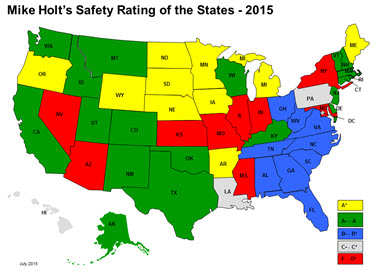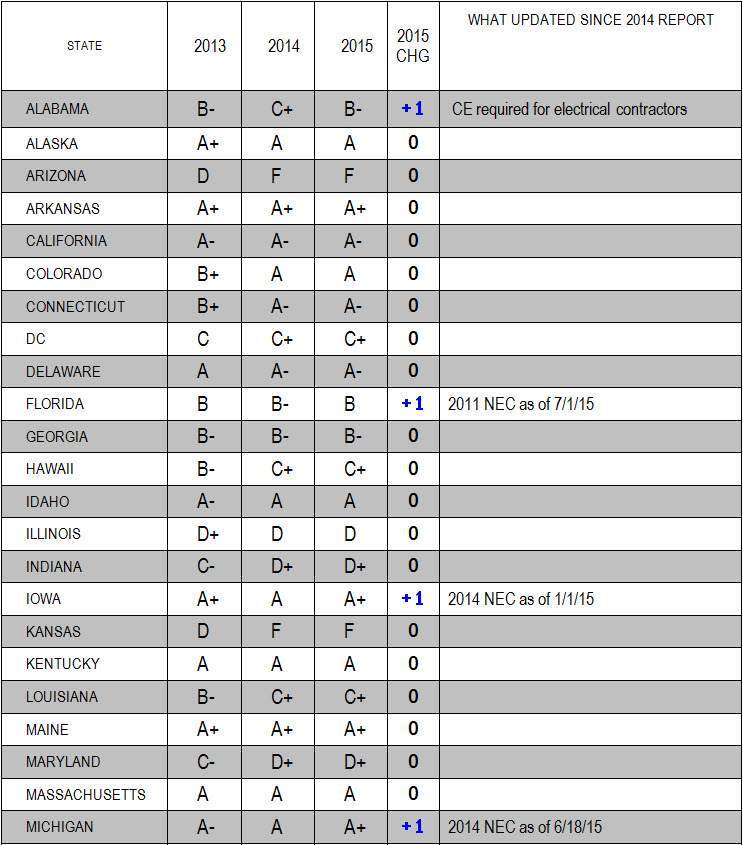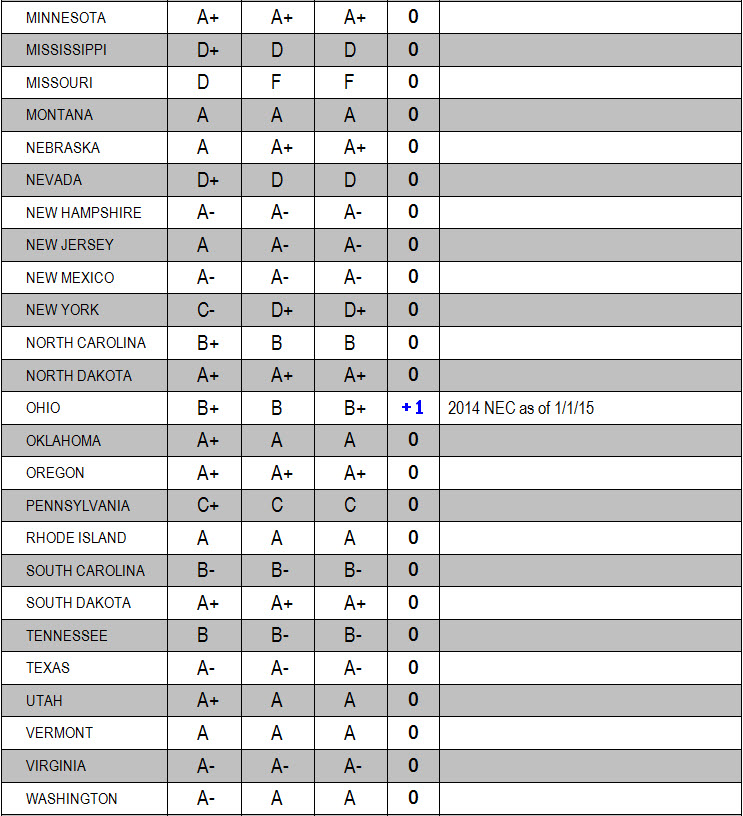
|
|
Mike Holt’s State Rating of the Electrical Industry - 2015 |
|
|

As part of our ongoing commitment to safety in the electrical community, we annually update our report that assigns a safety grade to each of the U.S. states based on points* for state-wide adoption and enforcement of the following electrical standards:
- The most current NEC®
- State licensing requirements for Apprentice, Journeyman, Master, Contractor, Inspector, Engineer
- Continuing Education requirements for license renewal
THE CURRENT NEC®
The 2014 NEC® became effective on August 21, 2013. This report, and the map, reflect those states that have adopted it.
“A+” [HIGHEST] RANKING
Arkansas, Iowa, Maine, Michigan, Minnesota, Nebraska, North Dakota, Oregon, South Dakota and Wyoming - a ‘full house” of points due to adoption of the 2014 NEC®, and meeting the state mandated requirements on all the categories evaluated for this analysis.
HERE’S THE RANKING
Click Here for a complete history since 2007, and details of how the points are assigned.



*HOW THE POINTS ARE ASSIGNED
One point is assigned to each element of the licensing type, and one point for each element of the continuing education requirements for that license type. To see details of the points behind the grades Click Here
The number of points assigned for adoption of the most current NEC is 3. This year 2014 NEC=3 points, 2011 NEC=2 points, 2008 NEC=1 point, 2005 NEC = 0 and prior NEC or local adoption = -1 point. States that have not adopted a newer edition of the NEC since the last report will automatically slide down one point due to the new scale. The points in the ‘2015 CHG’ column indicates the change since the last report showing whether the state went up (+), down (-) or stayed the same (0).
Important note: We know that there are many safe counties and municipalities that take licensing and enforcement seriously. This will not be reflected in the data reported here because this analysis is based on a uniform standard that is the State adoption of the requirements, regardless of whether local counties and municipalities have their own high standards.
WE APPRECIATE YOUR FEEDBACK!
If you have any updated information that you feel would change our rankings on this year’s report, please post your comment – we appreciate your feedback to help keep this analysis accurate and current.
ARCHIVE OF PAST REPORTS
Click Here for a complete history since 2007, and details of how the points are assigned.
We acknowledge and congratulate all those states, counties and local municipalities that continue to set high standards in electrical safety.
NEC® is a registered trademark of the National Fire Protection Agency.
|
|
|
|
Visit:
Exam Preparation
|
Continuing Education
|
Code Products
|
Newsletters
|
and more
|
|
|
| Copyright© Mike Holt Enterprises of Leesburg, Inc. All Rights Reserved This article is protected by United States copyright laws and may not be published without prior written permission. |
|
"... as for me and my house, we will serve the Lord" [Joshua 24:15]
|
|
|
Comments
|
Is there any documentation that locations that require licenseing have fewer incidents than those without it? Tom October 8 2015, 4:18 pm EDT
Reply to this comment |
Wisconsin does not require apprentice to be an licensed electrician. However our local gatekeeper collage requires this to prevent minority owned business from starting up. David Ford August 21 2015, 10:15 am EDT
Reply to this comment |
I must take exception to the ratings listed for the State of Missouri. At the very least a note should be added explaining adoption of building codes, including the electrical code, is performed at the county and municipality level. City of Saint Louis (2011) and Saint Louis County (2011) are moving to adopt 2014 NEC and should be completed by this fall, as is I believe Jefferson County.
From Missouri Revised Statutes:
"Communities may incorporate by reference certain technical codes--penalty provisions, requirements--definitions.
67.280. 1. As used in this section, the following terms mean:
(1) "Code", any published compilation of rules prepared by various technical trade associations, federal agencies, this state or any agency thereof, but shall be limited to: regulations concerning the construction of buildings and continued occupancy thereof; mechanical, plumbing, and electrical construction; and fire prevention;
(2) "Community", any county, fire protection district or municipality;
(3) "County", any county in the state;
(4) "Fire protection district", any fire protection district in the state;
(5) "Municipality", any incorporated city, town or village.
2. Any community, if the community otherwise has the power under the law to adopt such an ordinance, may adopt or repeal an ordinance which incorporates by reference the provisions of any code or portions of any code, or any amendment thereof, properly identified as to date and source, without setting forth the provisions of such code in full. ..." Craig Hartmann August 7 2015, 2:41 pm EDT
Reply to this comment |
Montana does license engineers, but the State doesn't require plans and specifications to be stamped by the appropriate design professional. For example, plans will be accepted if an architect stamps the first page (and there are no other stamps in the set).
It's common for electrical contractors to provide the "design" and include sheets in the set turned in for permit. Contractor's insurance always excludes coverage for design services, as they don't have the appropriate license for design.
For this reason, I believe Montana should lose all the engineering points.
Yup, I'm an electrical engineer. I'm also a master electrician.
Dana Lund
Dana Lund July 28 2015, 7:54 pm EDT
Reply to this comment |
How does your ranking (A to F)relate to the safety of the worker or of the installation. The question is "Does the bureaucracy create any value"?. Remind yourself that the more you spend on paperwork to support the bureaucracy, the less you have to innovate and manufacture.
DanK July 27 2015, 10:20 am EDT
Reply to this comment |
I don't see how Ohio can rate where it is. Other than engineers and contractors, there are no licensing requirements for anyone much less continuing education requirements. Mike Walker July 25 2015, 8:56 pm EDT
Reply to this comment |
AS of July 1 of 2015 the NEC 2014 became effective in the state of Washington
To renew a Journey-persons licenses requires a code update CEU requirement of 8 Ceu credit for renewal an Electrical Journey-person licenses.
A Journey-persons Licenses must be renewed ever 3 years upon their birthday john Gary July 25 2015, 12:45 am EDT
Reply to this comment |
Utah should be significantly lower. We haven't adopted the 2014, and at this point no one knows if we will. Furthermore, the legislature is trying to mandate that we do a cost benefit analysis for each change, meaning we may be stuck on the 2011 indefinitely. Utah has gone backwards in a major way, and i would recommend lower the grade to a D. Ryan Jackson July 24 2015, 7:32 pm EDT
Reply to this comment |
|
| |
|
|





